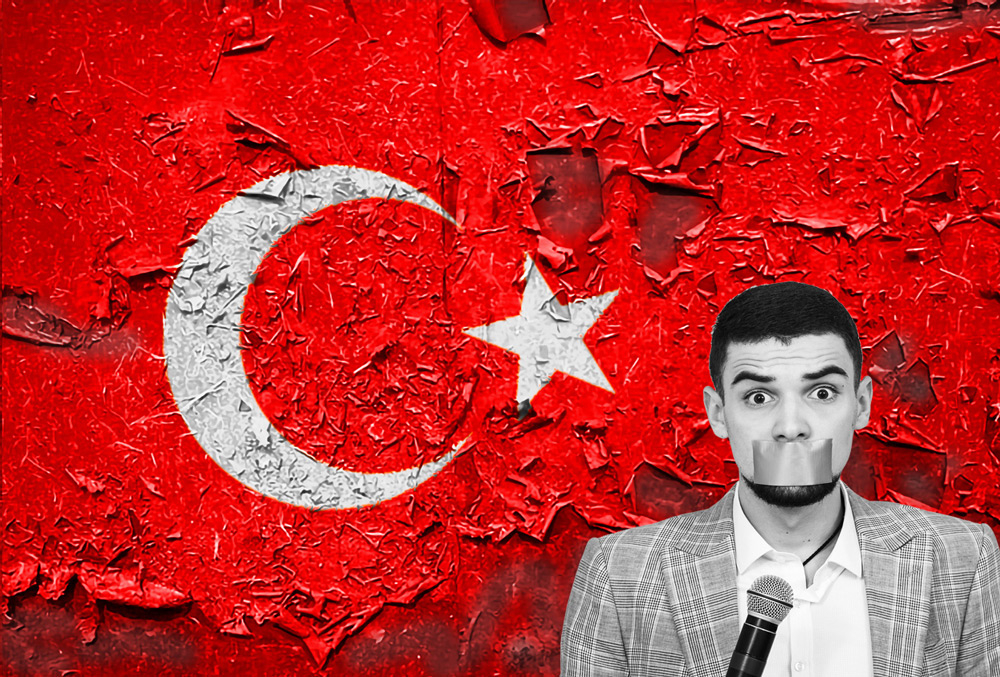 According to the Committee to Protect Journalists, Turkey is the world's top jailer of journalists. (Images source: iStock) |
From 1936 to 1938, the Soviet Union's Joseph Stalin brutally executed his "Great Purge," a more innocent name for the wholesale liquidation of "enemies of the state." The slaughter targeted, among others, Communist Party and government officials, journalists, academics, peasants, Jews, teachers, generals, members of the intelligentsia and many others. "Better that 10 innocent people suffer than one spy get away," said Nikolai Yezhov, chief of the NKVD (People's Commissariat for Internal Affairs). "When you chop wood, chips fly." In 1932, Stalin launched a war for the "Sovietization" of Russia. Seven decades later, Turkey's Islamist strongman and president, Recep Tayyip Erdoğan, launched his war to "Islamize" Ataturk's modern, secular Turkey.
According to the Committee to Protect Journalists, five countries are the world's top jailers of journalists. At the top of its list is Turkey, leaving behind China, Eritrea, Egypt and Saudi Arabia. Of the 172 reporters being held in those countries, 163 were detained without charge or for offenses classified as "anti-state" -- the same crime for which Stalin jailed and exiled Russian dissidents. Erdoğan's witch hunt is still going at full speed.
At the beginning of September, a prominent Turkish opposition official was sentenced by a court to nine years and eight months in prison for insulting Erdoğan and "engaging in terrorist propaganda" for tweets posted as early as 2012 and beyond. Canan Kaftancıoğlu, head of the main opposition Republican People's Party's Istanbul branch, was also accused of "insulting the government and public servants and inciting hatred and enmity." All of the charges against her were based on tweets posted years ago. But why was she sentenced now?
Kaftancıoğlu came to prominence only after her critical role in defeating Erdoğan's Justice and Development Party (AKP) in Istanbul's municipal elections on March 31 and June 23, ending Islamist rule in Turkey's biggest city after 25 years.
Kati Piri, the European Parliament's Turkey rapporteur, tweeted that the verdict was "surreal and outrageous," adding, "Erdoğan takes revenge for opposition's election victory. Unacceptable!"
More recently, on September 22, a Turkish man received a record-breaking prison sentence for insulting Erdoğan. Burhan Borak, a resident of the predominantly Kurdish province of Van in eastern Turkey, was sentenced to 12 years and 3 months in jail, for seven social media posts in 2014. The sentence was the severest punishment for cases of insult against the president, according to Borak's lawyer. (Between 2010 and 2017, 12,893 cases of insulting the president were filed, according to Professor Yaman Akdeniz, an academic and cyber rights activist.) With that, Erdoğan holds the title of the world's most insulted president -- a title he could have lost to Stalin if the Soviet dictator were still alive.
Instead of Stalin's gulags, Turkey has its courts. On September 20, a Turkish court held its first hearing of a case against two Bloomberg reporters accused of "trying to undermine Turkey's economic stability." The allegations against Kerim Karakaya and Fercan Yalınkılıç are based on a 2018 story they wrote about how Turkish authorities and banks were responding to the biggest currency shock in the country since 2001.
"They've been indicted for accurately and objectively reporting on highly newsworthy events," said Bloomberg Editor-in-Chief John Micklethwait. "We are committed to them and to press freedom and hope that the judiciary will do right by acquitting them."
Thirty-six other defendants, including prominent economist Mustafa Sönmez and journalist Sedef Kabaş, are also on trial for their social media comments on Turkey's economy and banks.
The pro-Erdoğan media are full of joy over the trial. "This [Bloomberg's report and social media accounts] is an economic coup [d'état]," wrote Ali Karaasanoğlu, a columnist for the Yeni Akit daily and a staunch supporter of Erdoğan. "You [addressing the defendants] are suspects of a serious crime of aiming to appreciate the U.S., British and EU currencies."
Against such gloomy background, Erdoğan keeps on teasing the civilized world. In May, Erdoğan said that Turkey was still committed to full membership in the European Union. He must have forgotten that, among hundreds of other hair-raising democratic deficits, he is the president of a country that has banned more than 245,000 websites and domains.
Burak Bekdil, one of Turkey's leading journalists, was recently fired from the country's most noted newspaper after 29 years, for writing in Gatestone what is taking place in Turkey. He is a Fellow at the Middle East Forum.


